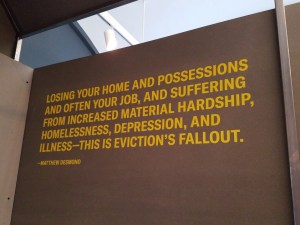Update: On Wednesday, November 7, the Housing Committee marked up the Eviction with Dignity Act. The only change was to ensure tenants could access their belongings on Saturdays upon request. (Please thank Councilmember Robert White for that amendment.) Now the full Council will vote on the bill on Tuesday, November 13. We are asking Councilmembers to support amendments on Tuesday to make the remaining changes listed below. Contact Chairman Phil Mendelson (pmendelson@dccouncil.us, 202-724-8032) and your Council member (find contact information here) and ask them to support amendments that bring more dignity and fairness to the already traumatizing act of eviction. For more information, read this from our friends at the Legal Aid Society of DC, who have been leading the charge to improve DC’s eviction process. Thank you!
Tomorrow morning, the DC Council Committee on Housing & Neighborhood Revitalization will hold a mark-up on the Eviction with Dignity Act of 2018. If you remember, we, along with many of our fellow advocates, testified on September 24 about ways that the new eviction procedure needed to be improved. After the hearing, the Committee convened a working group to talk about those ideas for improvement. We met on October 10. No promises were made that the vision of tenant advocates would prevail, but we did expect to have a robust process to try to reach agreement.
That didn’t happen. We had one meeting. Then we learned that the bill is moving to mark-up with virtually no changes. There’s an emergency bill in effect, so we have no idea why the Housing Committee feels like it has to rush through a bill that the community has raised significant concerns about. We are asking the Housing Committee to make critical changes before marking up the bill, and to commit to a longer process to figure out the best way to store people’s belongings after an eviction if they can’t gather them within the required window.
- As written, the bill could unintentionally increase the number of evictions in DC.
Problem: The new process only requires 14 day notice of eviction. However, many tenants are unable to get an appointment for Emergency Rental Assistance until they have a writ of eviction, and 14 days may not give them enough time to secure an appointment, bring in necessary paperwork, and receive eviction prevention funds. As a result, evictions that would have been prevented under the old eviction procedure will now move forward.
Solution: Extend the 14 day notice to 21 days.
- Tenants are confused about how to access their stored belongings, which will lead to increased disputes and unnecessary loss of belongings.
Problem: The notice provisions in the bill are not specific enough, leading to varying interpretations across DC. There has been confusion (among both tenants and landlords) regarding how to count the days of storage, and tenants remain unclear about when they have access to their belongings, and who they should contact to arrange for a time to move. If an eviction needs to be rescheduled, the tenant doesn’t know when it will happen. It is also unclear what a tenant is supposed to do or what the tenant is entitled to if a landlord does not comply with the notice or in-unit storage requirements.
Solution:
- Notices should be written to provide tenants with all of the information that they need to access the unit and move their belongings.
- The bill should require specific notice elements, including: the dates of both the eviction and the expiration of the in-unit storage period and contact information for the tenant to gain access to the unit.
- When an eviction is rescheduled, the tenant should receive a new 48-hour notice.
- There must be meaningful enforcement language that says what the remedy is for violation of these sections.
- Without any public storage option, tenants need more time to access and move out their belongings.
Problem: Although many people testified about the need for a public storage option, the Housing Committee’s working group had no conversation about storage before scheduling a mark-up (despite stating that it would be on the next meeting’s agenda). Without public storage, tenants need more time moving and transporting their belongings somewhere safe.
- The bill only allows tenants 7 days of in-unit storage. This is not enough if tenants have no way of moving their belongings into a storage unit.
- The bill does not state that any of the 16 hours that tenants have to move must occur at night or on the weekend, upon the tenant’s request.
- The bill does not recognize that seniors and persons with disabilities may need assistance or additional time to move their belongings
Solution:
- Extend the 7 day in-unit storage period to 10 days, which is the amount of time in the bill introduced by Councilmembers Anita Bonds and Trayon White.
- Require landlord to offer a portion of those 16 hours on evenings and weekends.
- Require landlords to provide additional accommodations to tenants who are elderly or disabled upon request.
- Not all residential tenants will be treated equally: DC’s lowest-income tenants, for instance, will have fewer protections.
Problem: The bill exempts from the in-unit storage requirement public housing tenants, some transitional housing tenants, and other tenants based on the legal claim raised in eviction court. Exempting certain types of residential evictions will only cause chaos and confusion.
Solution: All provisions of the bill should apply to all residential evictions taking place pursuant to an order of the DC Superior Court as well as the DC Housing Authority.
Tell the Chair of the Committee, Councilmember Anita Bonds (abonds@dccouncil.us, (202) 724-8105):
Do not to move forward with the Eviction with Dignity Act until it contains key improvements to make eviction less traumatic.
If you email Councilmember Bonds, copy the other members of the Committee as well: bnadeau@dccouncil.us, esilverman@dccouncil.us, rwhite@dccouncil.us, and twhite@dccouncil.us.







Dear Anita and all on the DC City Council,
Please do not move forward with this bill without significant improvements. DC faces and eviction crisis and, if not properly amended, this bill could make it worse. I don’t believe that is what you intend, so please make changes before moving forward. Thanks for considering my concerns! all the best, Mark Andersen